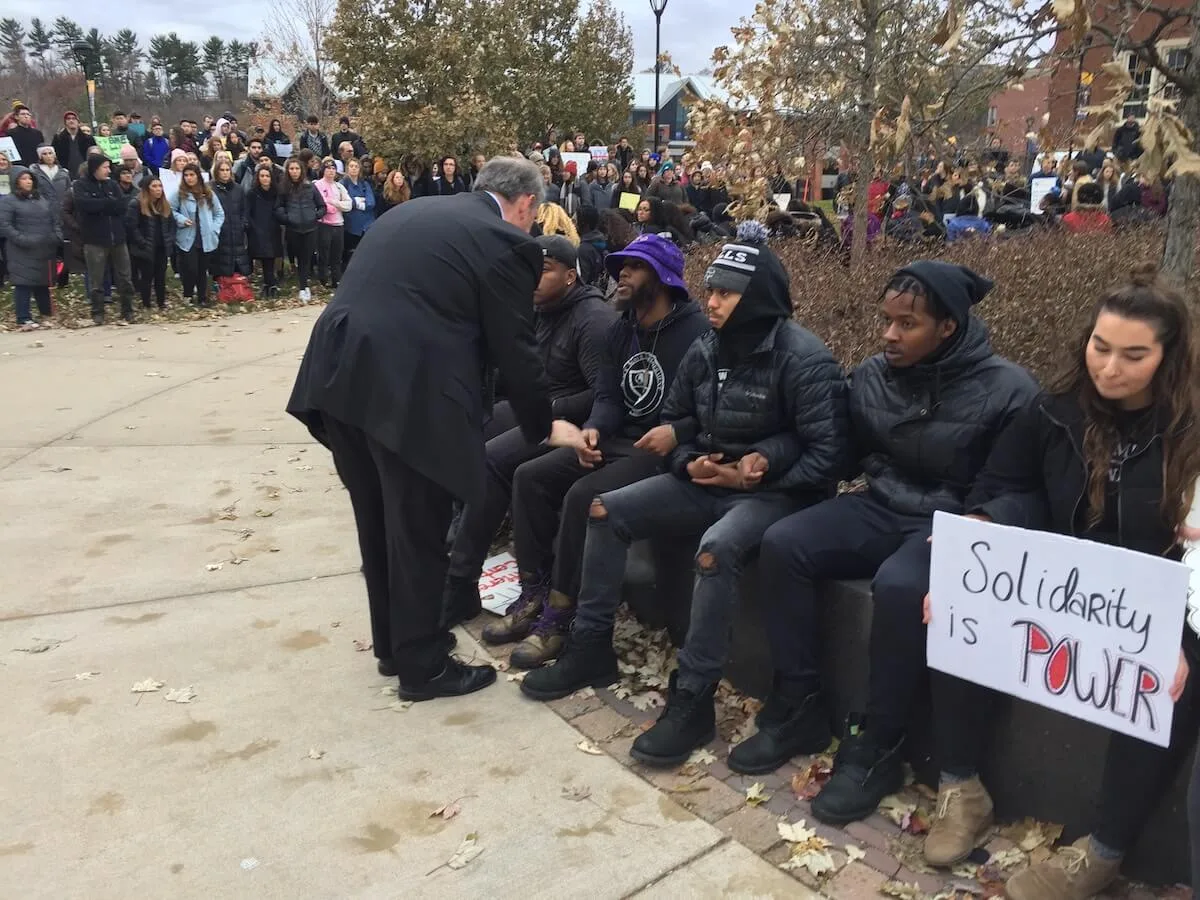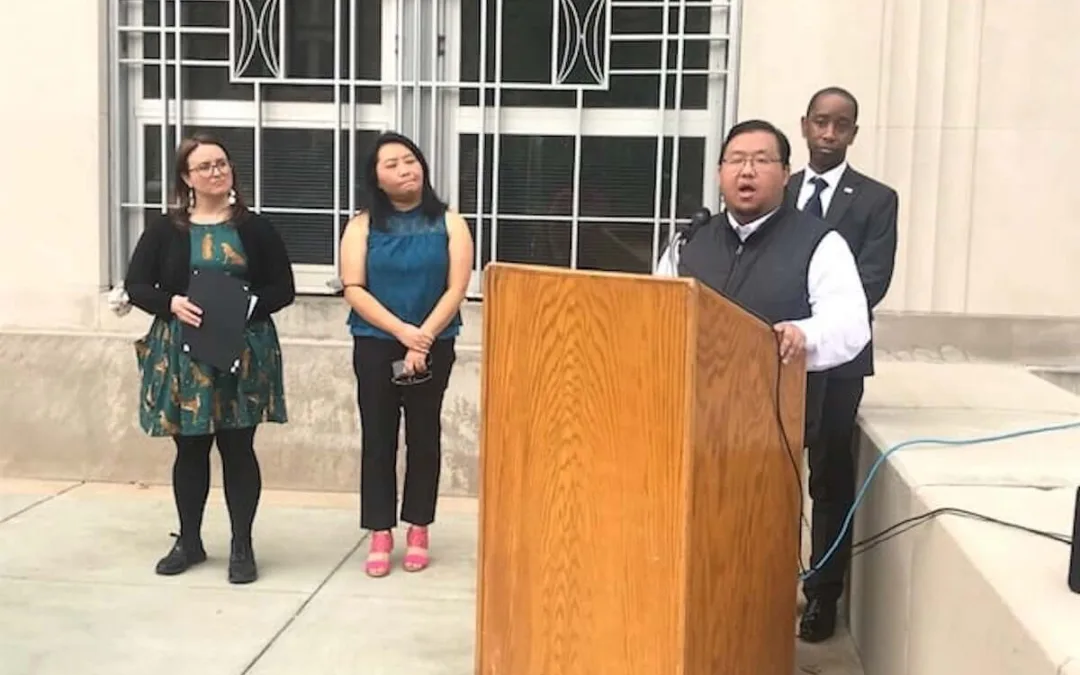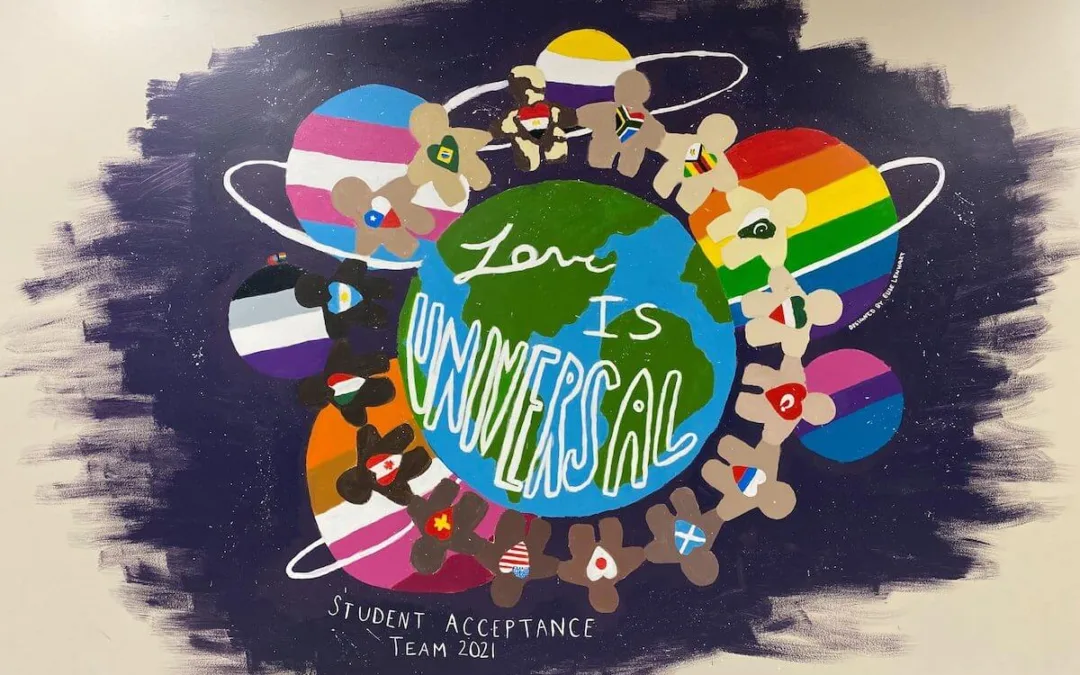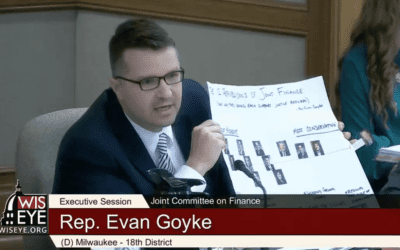
#image_title
UWEC chancellor describes actions taken since recent racist incidents
Editor’s note: In an interview with UpNorthNews, UW-Eau Claire Chancellor James Schmidt shared his reaction to two racist incidents on campus this past fall that garnered national headlines, as well as what the university is doing to address racism at the university and beyond.
When UW-Eau Claire Chancellor James Schmidt first learned about a racist message that was left on the dormitory room door of a UW-Eau Claire Native American student on Sept 15, waves first of shock, then frustration, anger and sorrow flooded his mind.
Schmidt re-lived that same power-packed, gut punch of emotions two months later, when he heard that members of the university’s football team had sent racist Snapchat messages mocking the university’s Black Male Empowerment organization. Those communications included images of Ku Klux Klan members and a burning cross.
“When these instances happened, it was very painful,” Schmidt said. “When my campus is in pain, I feel that. That was the part that was so disturbing … to see people suffering. I’m not in their shoes, but to see people suffering and feeling fear because of racist actions that occurred, that is very painful.”

Since arriving at UW-Eau Claire seven years ago as chancellor, Schmidt and administrators had worked to address racist views on campus. They implemented a process in which students and faculty discussed equity, diversity and inclusion (EDI), an effort to educate about racist attitudes and discuss strategies to curb racism.
The EDI process is part of the university’s faculty and staff evaluation process, Schmidt said, and UW-Eau Claire is among the first colleges in the nation to make EDI standards part of the university’s process to obtain faculty tenure.
Schmidt said he thought the university’s EDI efforts were making a positive difference to reduce racial instances and attitudes on campus. So when two much-publicized, racially-charged incidents occurred within two months of each other on his campus, Schmidt said he was taken aback.
“When that happened, it took me off guard,” the chancellor said. “It was so shocking, and it left people feeling so betrayed and threatened … It makes you question yourself. Are we missing something? Are we not doing the right things?”
The racist incidents on campus prompted outcry among UW-Eau Claire students and others, many of whom said the university was not doing enough to address race-related acts. At a public forum following the racist message on Native American student Kayde Langer’s door, she and two other Native American students spoke out about how university administrators needed to do more to address racism at the school. The racist Snapchat messages — which resulted in the suspension of five football team members — were followed by a student protest that attracted several hundred people and more national media headlines. On Nov. 26, at a university faculty meeting the day after the protest, professors and staff members of color described their fears about working on campus.
Even before those incidents, Schmidt said he was under no illusion that racist attitudes didn’t exist on campus. Too often, in past years, universities and other institutions “would sweep racist incidents under the rug, and hope the public didn’t find out about them,” he said. “Nowadays, we must acknowledge racism and make sure we do everything we can to address it.”
Doing so is important, Schmidt said, because racism suppresses opportunities, and the mission of higher education is to create opportunities, not just for some “but for every single person.”
Their heartfelt messages shared by faculty and students about racism on campus hit home for Schmidt. He directed the formation of a Rapid Action Task Force for Equity, Diversity and Inclusion, comprised of faculty, staff and students to come up with strategies that can be used to address racism in the near future. The task force’s recommendations are due at the end of this month.
Another, more broad task force –likely to include community members as well as those from the university– also will be formed, Schmidt said, and will seek to devise more long-term solutions to better address racism on campus and in the surrounding community.
Schmidt said the university received an outpouring of support from local businesses, the faith community and others in the wake of the two racists happenings. He said the response to racist acts must extend beyond the university to include the community, and that high expectations are necessary to make the Eau Claire area a more welcoming place for people of color.
“I think we need to set high goals, to hold ourselves and each other accountable,” Schmidt said. “If we can do that, and make this a place where people of color want to be, it will make this community that much stronger.”

Native American Leaders Seeking Improvements to Curriculum After Teacher Wears Racist Outfit
Insensitive depictions of Native Americans are demeaning and further negative views that help lead to violence against indigenous people, advocates...

After ‘Community for All’ Resolution Fails Again, Progressive Marathon County Officials Worry ‘This Might Set Us Back’
“This sends the message that some people don’t matter as much as others in our community,” one official said. Supporters of a controversial...

Commentary: Cedarburg’s School Mural Fiasco Shows Why We Need to Get Out of Our Bubbles
The district said the mural didn't represent "all members of our school community." But who was really left out? Earlier this month, the Cedarburg...

‘More Work Left’: First Police Reform Bills Pass, but Some Push for More
Evers says he’ll sign the bills, but he, legislative Democrats, and organizers say the state needs deeper reforms. Wisconsin will soon have a...




